A Lady's Parents And Sister Have Refused To Attend Her Wedding, And The Reason Might Leave You In Shock
Every dog owner is aware that there are many advantages to having a dog, from getting themselves out for work outs to getting loyal friendship. However, the presence of a dog is critical to the ability of some people with mental or emotional conditions to function normally on a daily basis.
Many disabled individuals rely on service animals to fully engage in daily life. Dogs are one of those animals.
They are trained to perform a variety of important tasks to assist individuals with disabilities. They can, for example, provide stability to an individual who finds it difficult to walk, retrieve items for an individual in a wheelchair, prevent a child suffering from autism from wandering off, and so many other things.
And this brings us to this story by a Reddit user named u/These-Rabbit9624, who has asked the Reddit AITA community to tell her if she is wrong for not letting her sister bring her service dog to her wedding. According to the story, her fiancé is not comfortable around golden retrievers because one of them attacked him when he was 11 and needed therapy to get through the experience.
Her parents threatened her, using the ADA law as an excuse. Well, according to the Americans with Disabilities Act, service animals are exceptionally trained to perform explicit tasks for people with disabilities, and these disabilities can be sensory, physical, mental, intellectual, or psychiatric.
From the horse's mouth:


She continues her story...
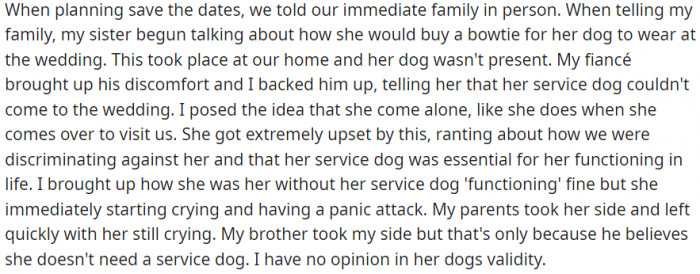
Family Dynamics and Wedding Planning
Family dynamics can significantly influence wedding planning, often leading to conflicts based on differing values and expectations.
Research in family psychology suggests that differing opinions about weddings can stem from cultural backgrounds, personal experiences, and family traditions.
This illustrates how a couple's choices can sometimes challenge family norms, resulting in tension.
Understanding Family Dynamics
Family dynamics can be complex, particularly when it comes to significant life events like weddings. The differing opinions and expectations of family members can lead to conflicts that strain relationships, especially when personal values are involved.
Research from the Journal of Family Psychology indicates that significant life changes often provoke strong emotional reactions, revealing underlying family tensions.
The Psychology Behind Wedding Decisions
Dr. Michelle Reed, a psychologist specializing in family dynamics, explains that wedding planning can often trigger underlying family tensions.
Research indicates that significant life events, like weddings, can bring to the surface unresolved conflicts, particularly within families.
Understanding these dynamics is crucial for couples navigating the complexities of their relationships with family members.
And finally...

There are many inquiries regarding how the Americans with Disabilities Act (ADA) applies to service animals. The ADA simply requires state and local government offices, organizations, and non-profit associations that provide goods and services to the general public to make reasonable changes where necessary in their strategies, practices, or methods to oblige individuals with disabilities.
The rule for service animals falls under this overall guideline, and in accordance, entities with a "no pets" strategy must adjust their policy to permit service animals into their establishments. Emotional support animals are characterized by their capacity to comfort individuals by giving love and friendship.
Although they don't get any conventional training, they are of major assistance to those who experience the ill effects of mental and emotional issues. Their primary responsibility is to provide emotional solace to their owners.
The pet provides emotional support and comfort that assists them in dealing with difficulties that may, in some way or another, undermine their quality of life, and these pets are known as emotional support animals (ESAs).
Here are comments from redditors on this issue:
1. She can not just attend
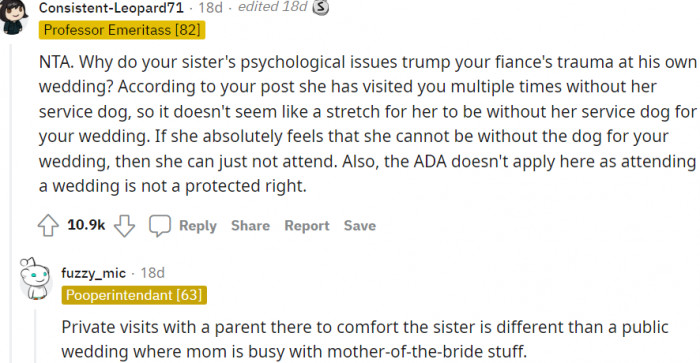
2. ADA Laws do not apply
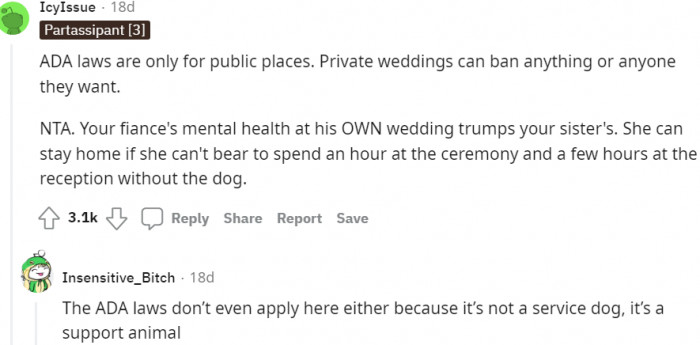
A family therapist highlights that it's common for family members to project their expectations onto significant life events, like weddings.
When a couple's vision differs from family expectations, it can generate feelings of disappointment or rejection among family members.
Understanding these dynamics can help couples navigate family conflicts while honoring their desires.
In this case, the bride's decision may reflect her values and desires, which may not align with her family's expectations. When individuals assert their independence, it can trigger feelings of rejection or abandonment among family members, leading to further conflict.
Studies suggest that family members often struggle with accepting choices that diverge from their own beliefs, highlighting the need for open communication and understanding.
From a psychological perspective, the refusal of family members to attend a wedding can evoke feelings of rejection and abandonment.
Studies show that such emotional responses can significantly impact an individual's self-esteem and relational well-being.
Recognizing these emotional undercurrents can help individuals process their feelings more effectively.
3. Weighing mental health condition...

4. An emotional support animal

5. Threats, really?

Navigating Conflicts During Wedding Planning
Effective conflict resolution strategies can help couples manage family tensions during wedding planning.
Studies show that couples who approach disagreements with empathy and open communication often experience better outcomes.
Fostering understanding among family members can alleviate tensions and create a more supportive environment.
The Role of Individual Values in Conflict
Individual values play a significant role in shaping decisions, particularly regarding marriage and family expectations. When personal values clash with familial expectations, it can create significant emotional distress for all involved.
Research indicates that individuals who prioritize authenticity in their relationships often experience greater emotional well-being, despite potential conflicts with family members.
Navigating Family Dynamics
Effective communication is essential when addressing family issues surrounding weddings.
Research from the Journal of Family Psychology emphasizes that open conversations can alleviate tensions and facilitate understanding among family members.
Encouraging these discussions can help couples feel more supported during their wedding planning process.
6. That's their choice

7. Compromising...
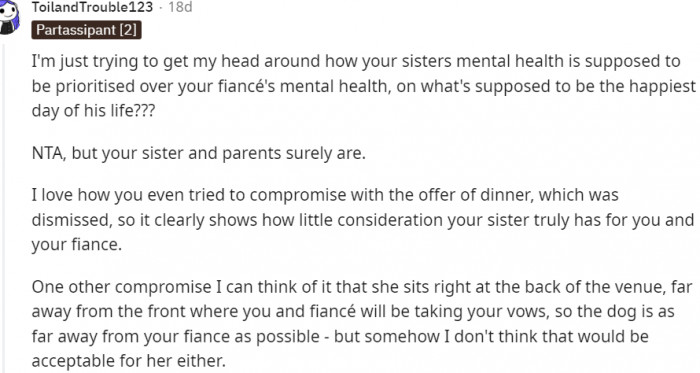
8. "Your husband's needs are higher"

To mitigate family conflicts, couples can establish clear boundaries regarding their wedding plans while remaining open to dialogue.
Research indicates that setting boundaries in relationships can promote healthier interactions and reduce feelings of resentment.
Creating a shared vision while respecting family members' feelings can help ease tensions.
Moreover, understanding the motivations behind each family member's perspective can foster empathy and reduce conflict. Engaging in discussions that explore these motivations can help family members navigate their feelings and find common ground.
Studies show that fostering empathy in familial relationships can lead to improved communication and reduced tensions.
Moreover, family dynamics often reflect broader cultural and societal pressures that can complicate individual choices.
Studies indicate that societal expectations can shape family opinions and behaviors, leading to conflicts in personal decisions.
Acknowledging these societal influences can help individuals navigate their family relationships more effectively.
9. She doesn't need the dog

10. Someone is asking for the difference...

11. Not covered by ADA Laws...

The Psychological Impact of Family Reactions
Family reactions to wedding plans can have profound emotional effects on the couple, often influencing their sense of support and belonging.
According to studies in social psychology, perceived support from family members can enhance well-being and relationship satisfaction.
Understanding the emotional dynamics at play can empower couples to navigate these reactions more effectively.
The Importance of Open Communication
Open communication is essential for resolving conflicts within families. When family members feel safe expressing their thoughts and emotions, it can create an environment conducive to understanding and resolution.
Research from the American Psychological Association emphasizes the importance of communication in promoting healthy family dynamics, particularly during significant life transitions.
The Importance of Setting Boundaries
Setting clear boundaries is crucial in maintaining healthy relationships with family members.
Research shows that individuals who establish and communicate their expectations tend to experience less conflict and more supportive interactions.
This clarity can empower couples to make decisions about their weddings without undue influence from family members.
12. Not on edge

13. A complicated situation

14. That's how it is

Additionally, employing active listening techniques can enhance communication, allowing family members to feel heard and validated. This approach can foster a sense of connection and reduce defensiveness, paving the way for more constructive discussions.
Ultimately, creating a space for honest dialogue can help family members navigate their feelings and find resolutions.
Additionally, understanding the emotional responses of family members can enhance empathy and reduce conflict.
Psychological studies suggest that when individuals consider the feelings of others, they are better equipped to manage tensions and promote harmony.
This empathetic approach can lead to healthier family interactions during challenging times.
15. The mental health of the person getting wedded wins...

16. He's kinda essential

17. An actual service animal or an emotional support animal?

Navigating Emotional Reactions
Emotional reactions are natural responses to conflicts within families. When individuals feel their values are being challenged, it can lead to feelings of anger, hurt, or disappointment.
Research indicates that acknowledging these emotions is crucial for resolution, as suppressing or ignoring them can lead to further misunderstandings and resentment.
Coping with Rejection
Coping with family rejection requires emotional resilience and support.
Research from the University of Pennsylvania indicates that individuals who cultivate strong support networks tend to fare better in the face of family conflicts.
Building these networks can provide the emotional backing necessary to navigate difficult family dynamics.
18. Entitlements

19. Two points to address...
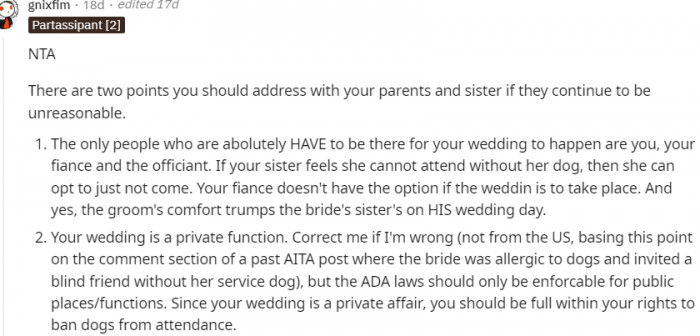
20. A pack of advice...

Encouraging family members to express their emotions constructively can promote healing and understanding. This approach can lead to a more compassionate environment where family members support one another despite their differences.
Ultimately, fostering emotional awareness can enhance family relationships and facilitate healthier resolutions to conflicts.
In summary, navigating family dynamics during wedding planning requires understanding the emotional complexities involved.
By fostering open communication, setting boundaries, and developing emotional resilience, couples can enhance their ability to manage family tensions.
This approach can lead to a more supportive environment as they embark on this significant life event.
21. It's their loss...

22. ADA Laws protect service animals...

Service dogs are entitled to full public access, which implies that they can go where other animals aren't permitted, and this includes eateries, libraries, and public transportation. Some of the service dogs individuals use are American and English Labradors, Golden Retrievers, German Shepherds, Poodles, border collies, Pomeranians, etc.
The Reddit post got more than 6,000 upvotes and 1.5K comments.
Psychological Analysis
This situation illustrates the emotional complexities that often arise during wedding planning.
Recognizing and addressing these dynamics can help couples navigate family tensions more effectively, leading to a more harmonious experience.
Analysis generated by AI
Analysis & Alternative Approaches
Research highlights the importance of emotional understanding and communication in navigating family dynamics during significant life events.
By addressing these complexities, couples can foster healthier relationships with family members and enjoy their wedding experience more fully.
Finding Common Ground
In any family conflict, finding common ground can be a powerful tool for resolution. When family members identify shared values or goals, it can foster a sense of unity and collaboration.
Research from the Journal of Conflict Resolution indicates that focusing on commonalities rather than differences can significantly reduce tension and promote constructive dialogue.
Analysis & Alternative Approaches
Family conflicts, especially around significant events like weddings, can evoke strong emotions and reveal underlying tensions. However, with open communication, empathy, and a focus on shared values, families can navigate these challenges more effectively.
Ultimately, fostering understanding and compassion can strengthen familial bonds and promote healthier relationships.
Analysis & Alternative Approaches
In conclusion, navigating family dynamics during wedding planning requires a balance of empathy, communication, and boundary-setting.
Research consistently shows that effective conflict resolution strategies can lead to healthier family relationships and a more joyful wedding experience.



